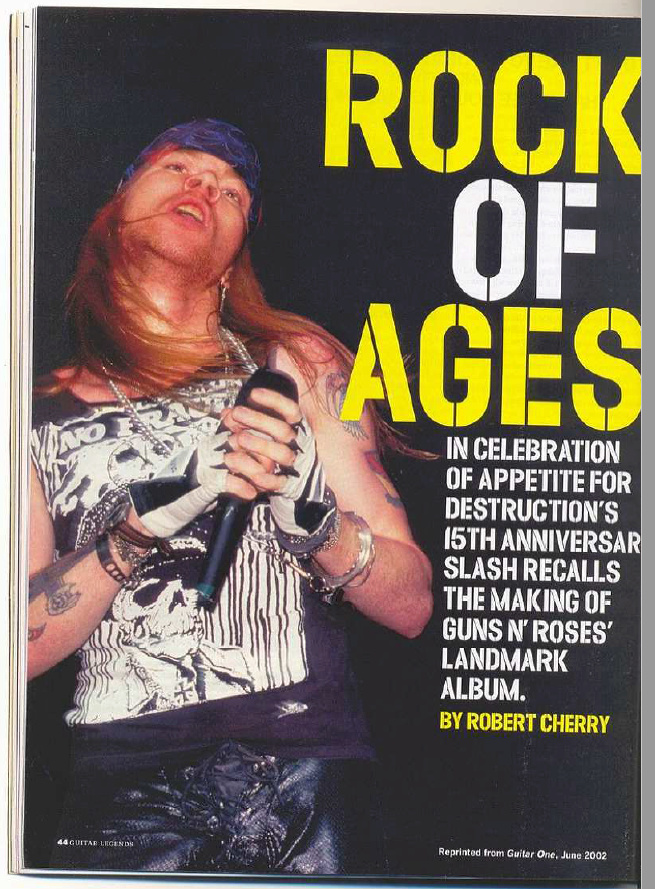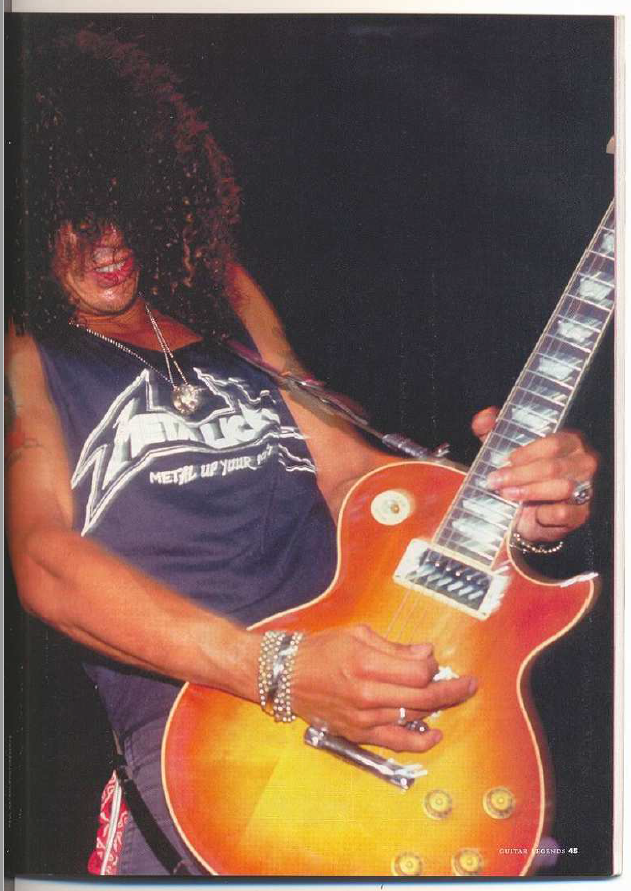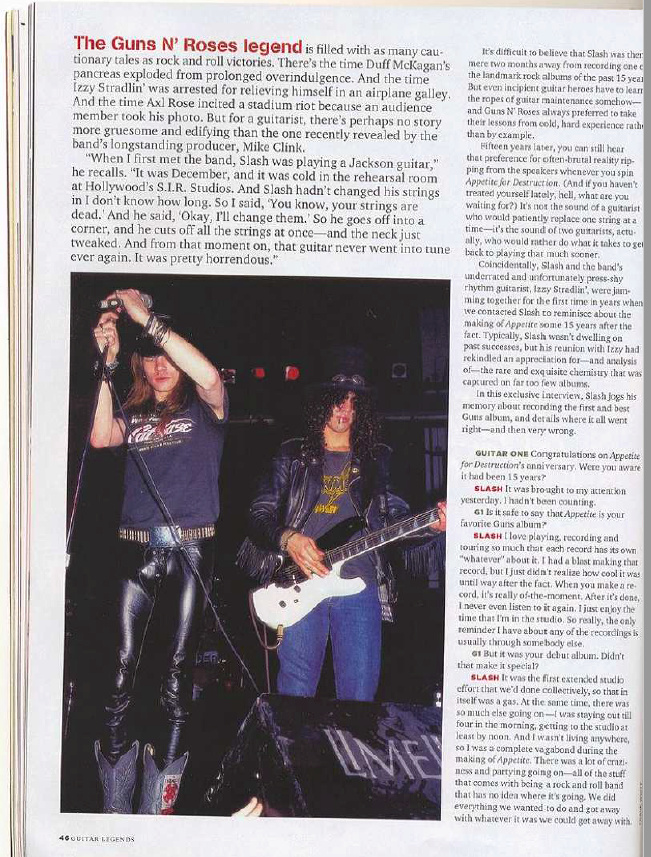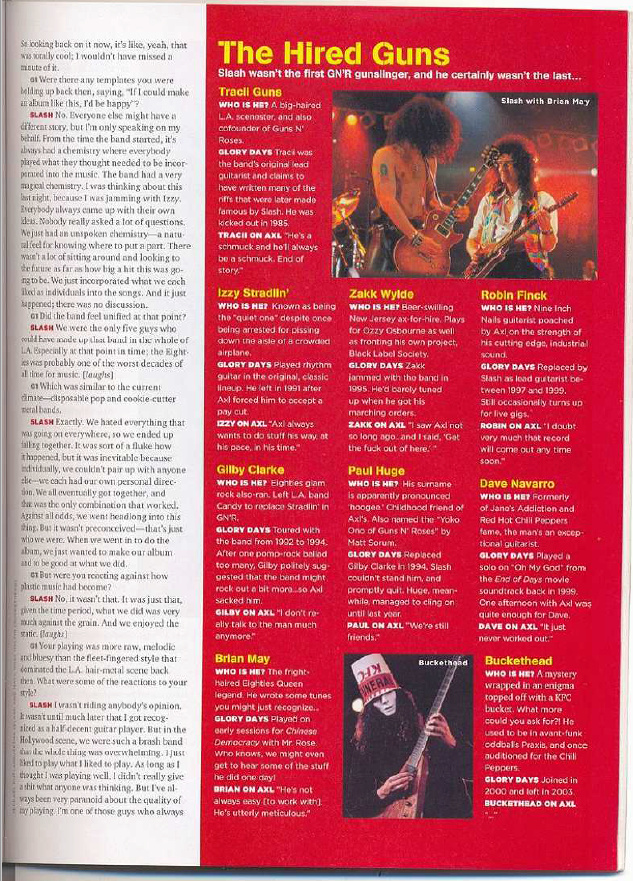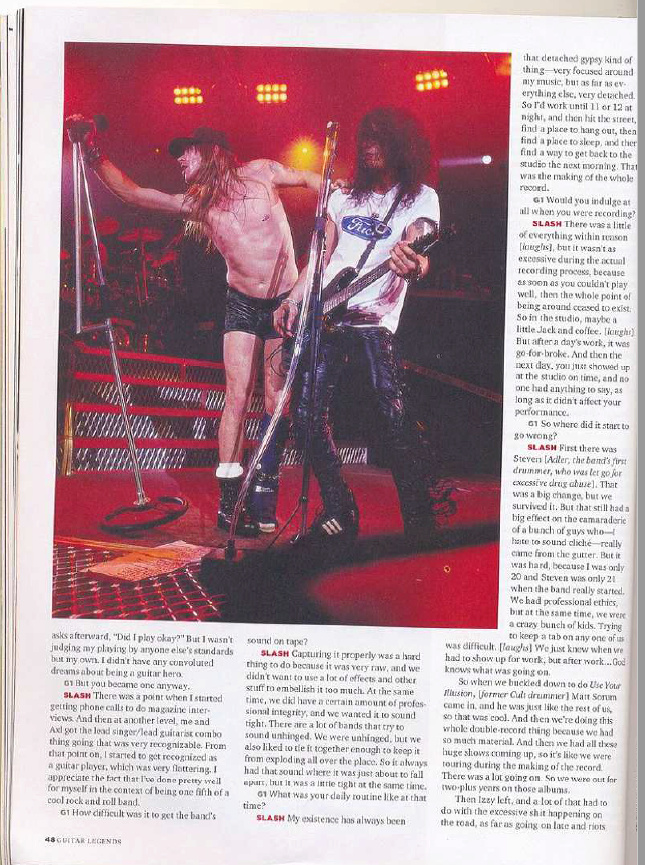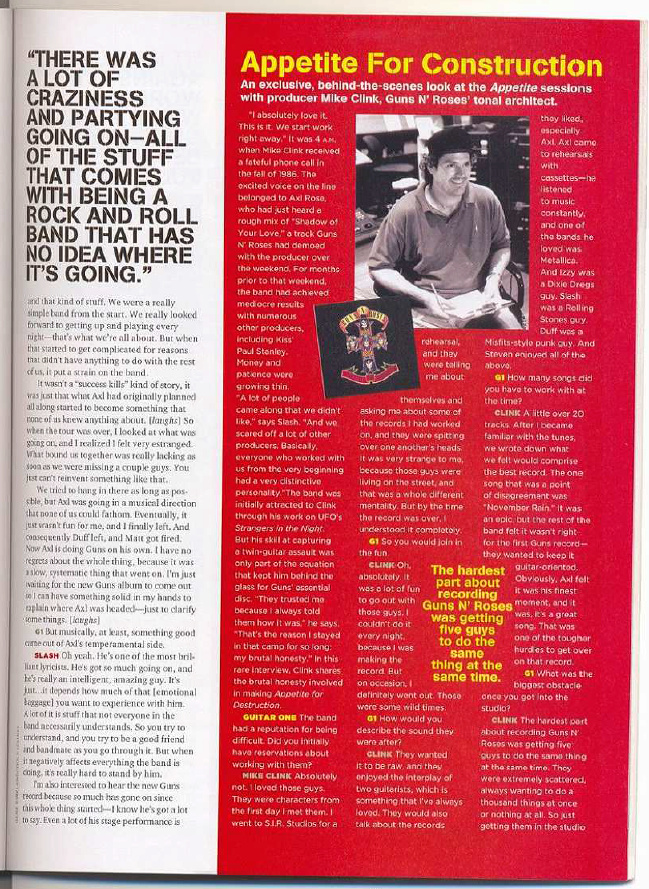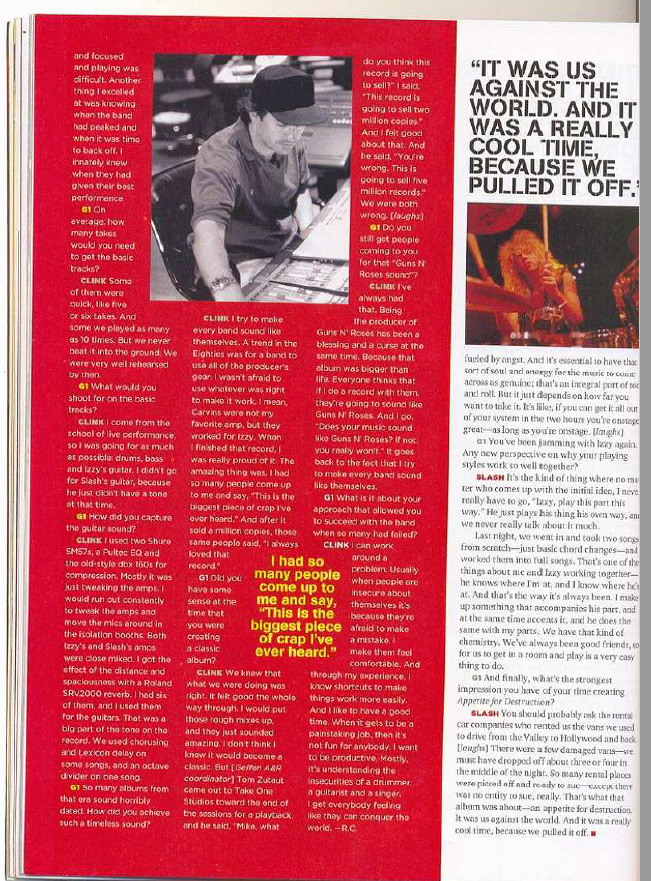2002.06.DD - Guitar One - Rock Of Ages (Slash, Mike Clink)
2 posters
Page 1 of 1
 2002.06.DD - Guitar One - Rock Of Ages (Slash, Mike Clink)
2002.06.DD - Guitar One - Rock Of Ages (Slash, Mike Clink)
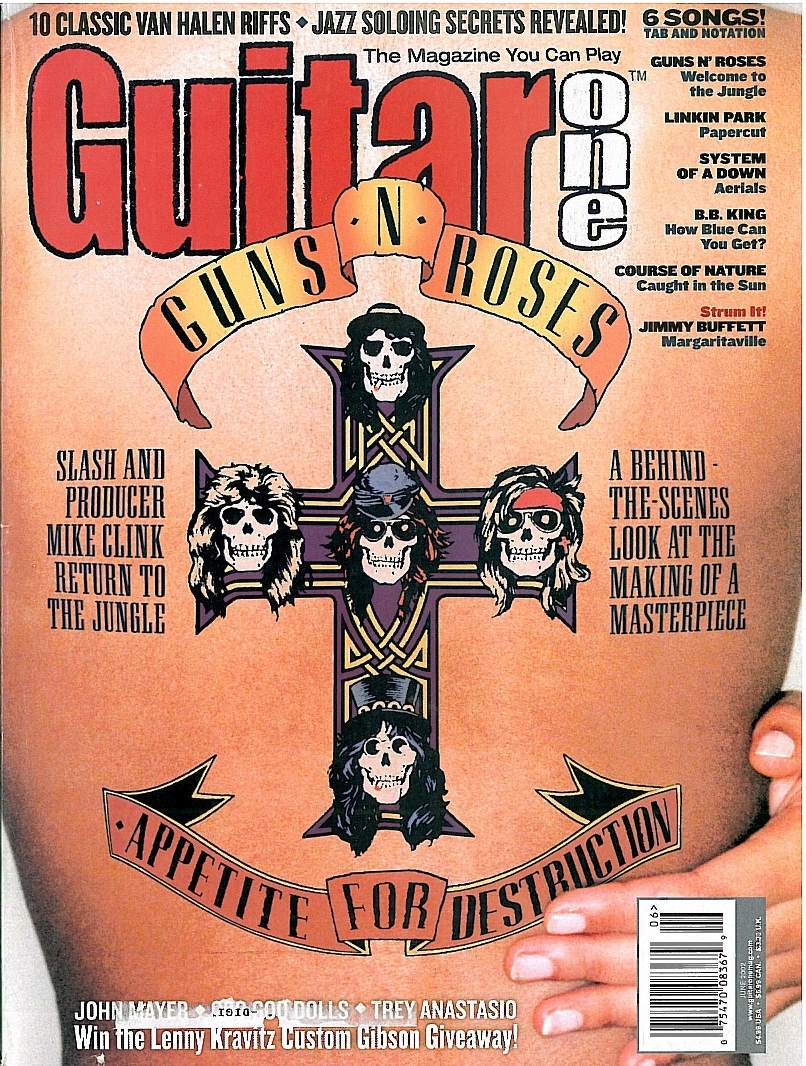
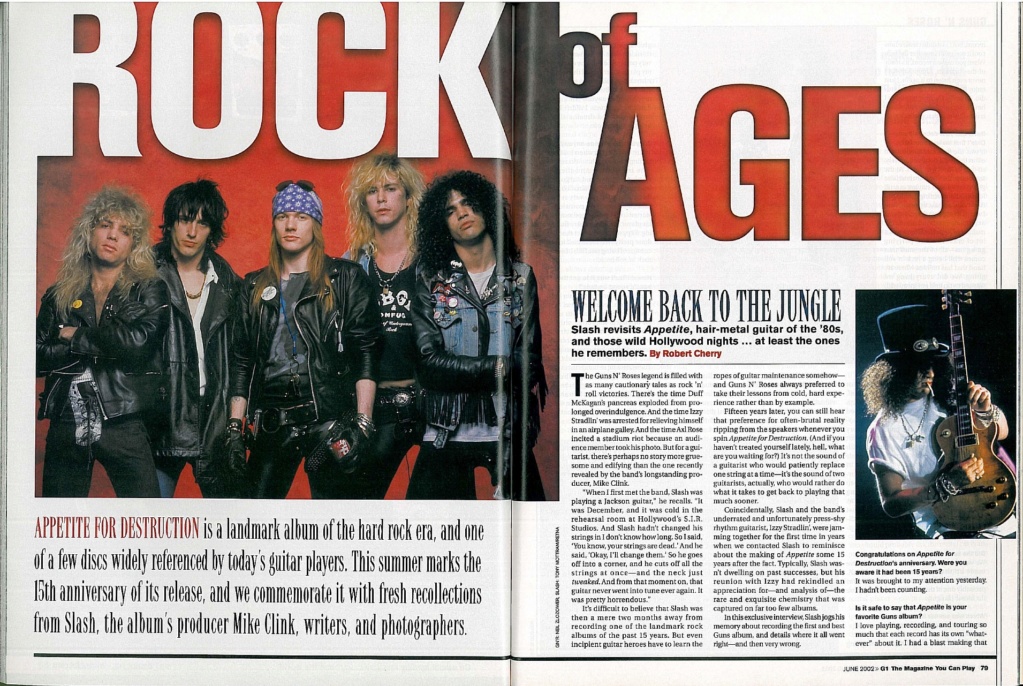
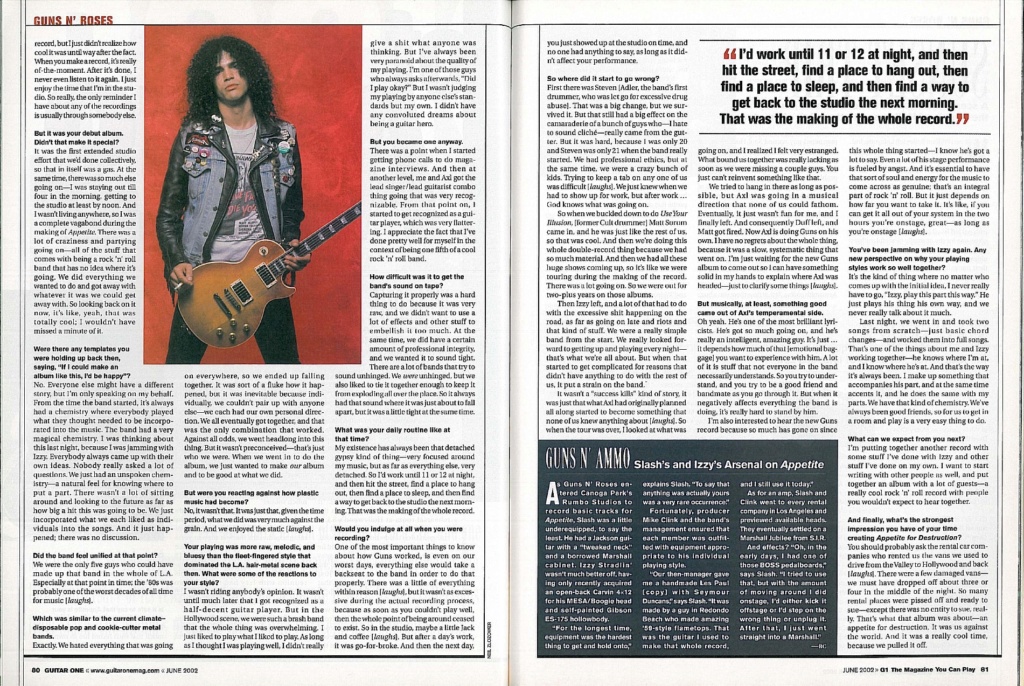
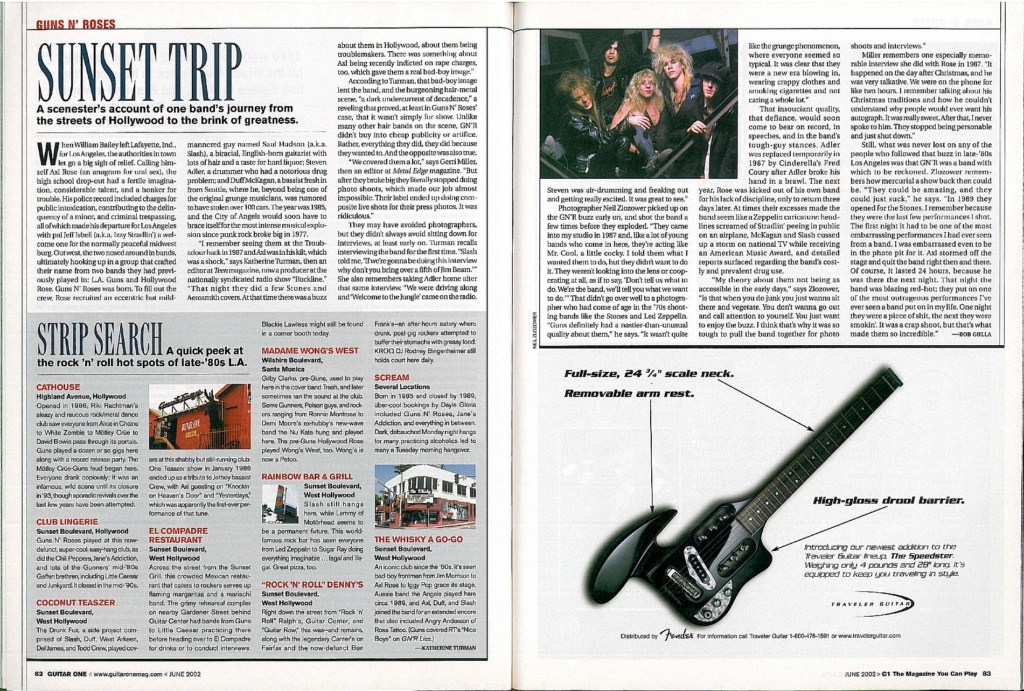
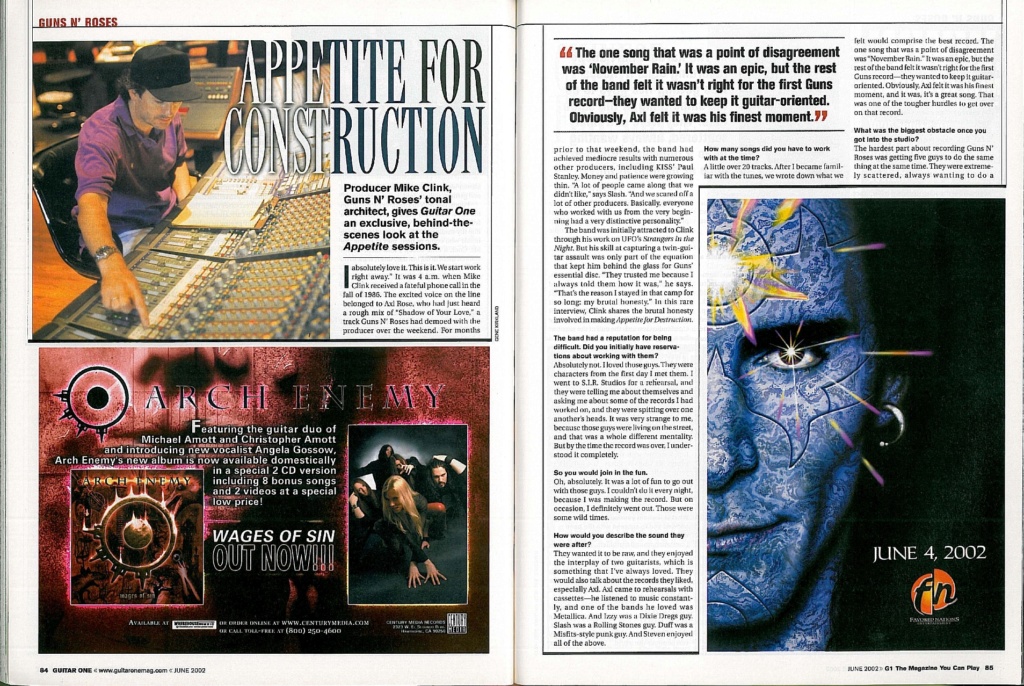
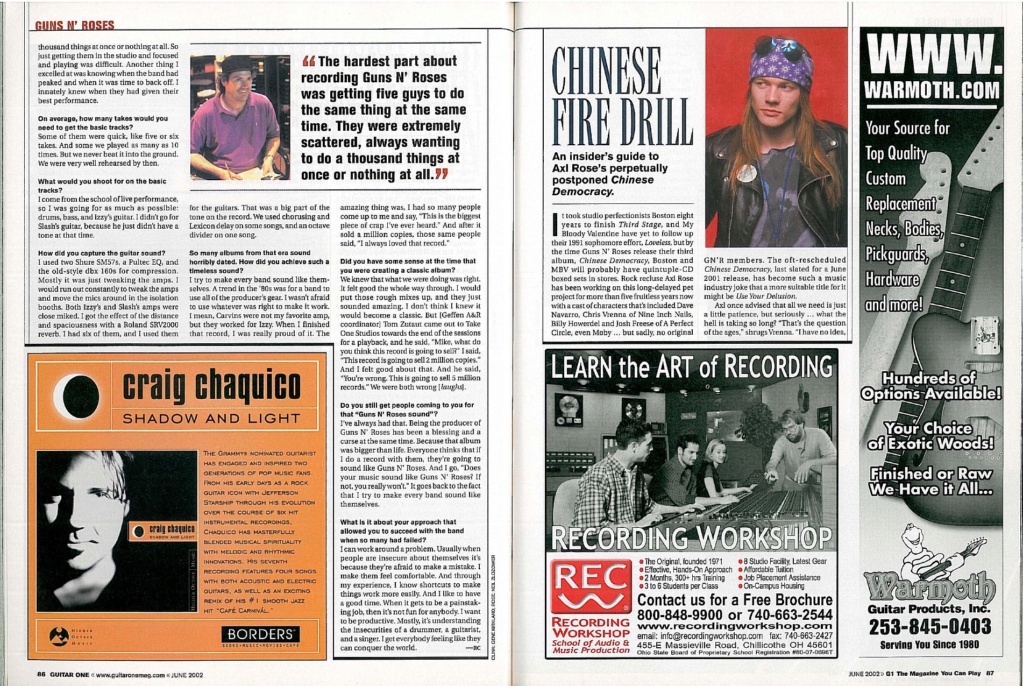
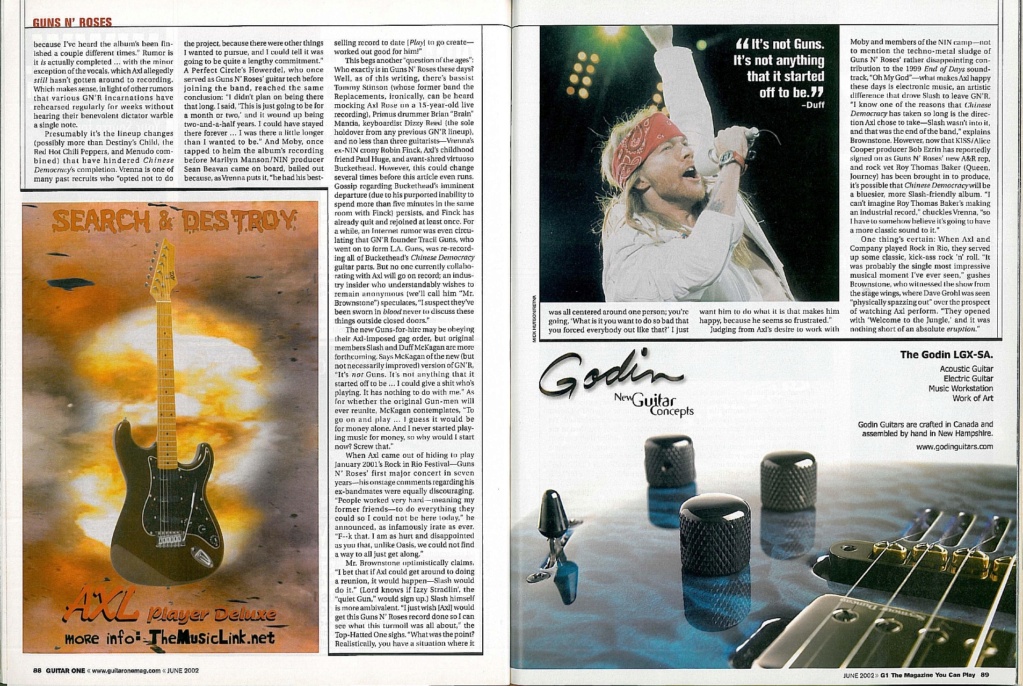
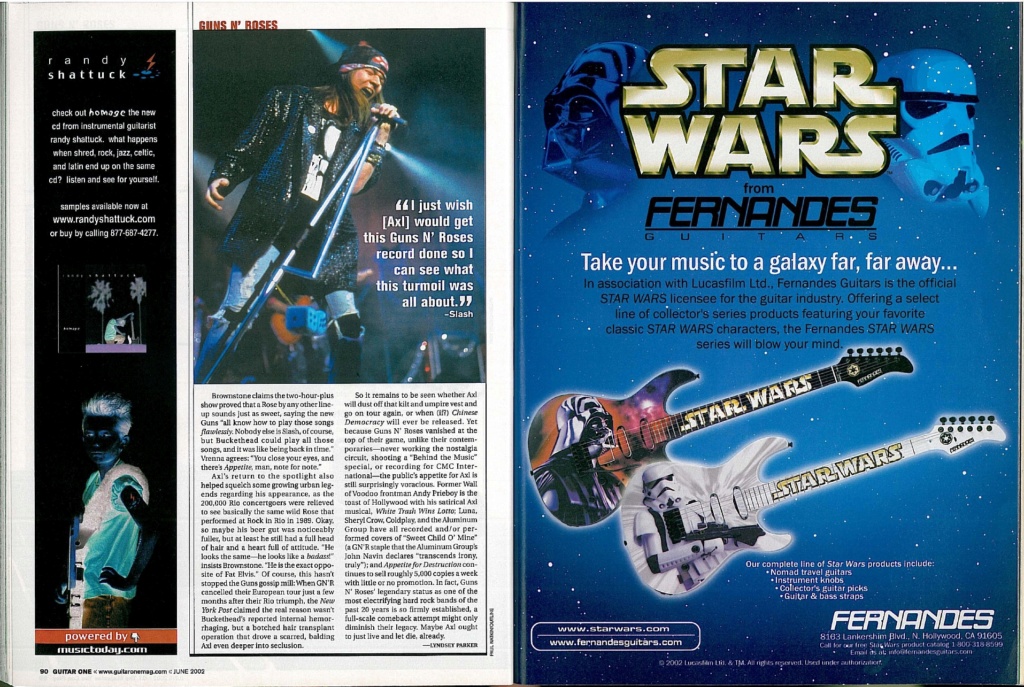
Transcript:
ROCK of AGES
Appetite for Destruction is a landmark album of the hard rock era, and one of a few discs widely referenced by today's guitar players. This summer marks the 15th anniversary of its release, and we commemorate it with fresh recollections from Slash, the album's producer Mike Clink, writers, and photographers.
WELCOME BACK TO THE JUNGLE
Slash revisits Appetite, hair-metal guitar of the 80's, and those wild Hollywood nights… at least the ones he remembers. By Robert Cherry.
The Guns N' Roses legend is filled with as many cautionary tales as rock 'n' roll victories. There's the time Duff McKagan's pancreas exploded from prolonged overindulgence. And the time Izzy Stradlin' was arrested for relieving himself in an airplane galley. And the time Axl Rose incited a stadium riot because an audience member took his photo. But for a guitarist, there's perhaps no story more gruesome and edifying than the one recently revealed by the band's longstanding producer, Mike Clink.
"When I first met the band, Slash was playing a Jackson guitar," he recalls. "It was December, and it was cold in the rehearsal room at Hollywood's S.I.R. Studios. And Slash hadn't changed his strings in I don't know how long. So I said, 'You know, your strings are dead.' And he said, 'Okay, I'll change them.' So he goes into a corner, and he cuts off all the strings at once - and the neck just tweaked. And from that moment on, that guitar never went into tune again. It was pretty horrendous."
It's difficult to believe that Slash was then a mere two months away from recording one of the landmark rock albums of the past 15 years. But even incipient guitar heroes have to learn the ropes of guitar maintenance somehow - and Guns N' Roses always preferred to take their lessons from cold, hard experience rather than by example.
Fifteen years later, you can still hear that preference for often-brutal reality ripping from the speakers whenever you spin Appetite For Destruction. (And if you haven't treated yourself lately, hell, what are you waiting for?) It's not the sound of a guitarist who would patiently replace one string at a time - it's the sound of two guitarists, actually, who would rather do what it takes to get back to playing that much sooner.
Coincidentally, Slash and the band's underrated and unfortunately press-shy rhythm guitarist, Izzy Stradlin', were jamming together for the first time in years when we contacted Slash to reminisce about the making of Appetite some 15 years after the fact. Typically, Slash wasn't dwelling on past successes, but his reunion with Izzy had rekindled an appreciation for - and analysis of - the rare and exquisite chemistry that was captured on far too few albums.
In this exclusive interview, Slash jogs his memory about recording the first and best Guns album, and details where it all went right - and then very wrong.
Congratulations on Appetite for Destruction's anniversary. Were you aware it had been 15 years?
Slash: It was brought to my attention yesterday. I hadn't been counting.
Is it safe to say that Appetite is your favorite Guns album?
I love playing, recording, and touring so much that each record has its own "whatever" about it. I had a blast making that record, but I just didn't realize how cool it was until way after the fact. When you make a record, it's really of-the-moment. After it's done, I never even listen to it again. I just enjoy the time that I'm in the studio. So really, the only reminder I have about any of the recordings is usually through someone else.
But it was your debut album. Didn't that make it special?
It was the first extended studio effort that we'd done collectively, so that in itself was a gas. At the same time, there was so much else going on - I was staying out till four in the morning, getting to the studio at least by noon. And I wasn't living anywhere, so I was a complete vagabond during the making of Appetite. There was a lot of craziness and partying going on - all of the stuff that comes with being a rock 'n' roll band that has no idea where it's going. We did everything we wanted to do and got away with whatever it was we could get away with. So looking back on it now, it's like, yeah, that was totally cool; I wouldn't have missed a minute of it.
Were there any templates you were holding up back then, saying, "If I could make an album like this, I'd be happy"?
No. Everyone else might have a different story, but I'm only speaking on my behalf. From the time the band started, it's always had chemistry where everybody played what they thought needed to be incorporated into the music. The band had a very magical chemistry. I was thinking about this last night, because I was jamming with Izzy. Everybody always came up with their own ideas. Nobody really asked a lot of questions. We just had an unspoken chemistry - a natural feel for knowing where to put a part. There wasn't a lot of sitting around and looking to the future as far as how big a hit this was going to be. We just incorporated what we each liked as individuals into the songs. And it just happened; there was no discussion.
Did the band feel unified at that point?
We were the only five guys who could have made up that band in the whole of L.A. Especially at that point in time; the '80s was probably one of the worst decades of all time for music [laughs].
Which was similar to the current climate - disposable pop and cookie-cutter metal bands.
Exactly. We hated everything that was going on everywhere, so we ended up falling together. It was sort of a fluke how it happened, but it was inevitable because individually, we couldn't pair up with anyone else - we each had our own personal direction. We all eventually got together, and that was the only combination that worked. Against all odds, we went headlong into this thing. But it wasn't preconceived - that's just who we were. When we went in to do the album, we just wanted to make our album and to be good at what we did.
But were you reacting against how plastic music had become?
No, it wasn't that. It was just that, given the time period, what we did was very much against the grain. And we enjoyed the static [laughs].
Your playing was more raw, melodic, and bluesy than the fleet-fingered style that dominated the L.A. hair-metal scene back then. What were some of the reactions to your style?
I wasn't riding anybody's opinion. It wasn't until much later that I got recognized as a half-decent guitar player. But in the Hollywood scene, we were such a brash band that the whole thing was overwhelming. I just liked to play what I liked to play. As long as I thought I was playing well, I didn't really give a shit what anyone else was thinking. But I've always been very paranoid about the quality of my playing. I'm one of those guys who always asks afterwards, "Did I play okay?" But I wasn't judging my playing by anyone else's standards but my own. I didn't have any convoluted dreams about being a guitar hero.
But you became one anyway.
There was a point when I started getting phone calls to do magazine interviews. And then at another level, me and Axl got the lead singer/lead guitarist combo thing going that was very recognizable. From that point on, I started to get recognized as a guitar player, which was very flattering. I appreciate the fact that I've done pretty well for myself in the context of being one fifth of a cool rock 'n' roll band.
How difficult was it to get the band's sound on tape?
Capturing it properly was a hard thing to do because it was very raw, and we didn't want to use a lot of effects and other stuff to embellish it too much. At the same time, we did have a certain amount of professional integrity, and we wanted it to sound tight. There are a lot of bands that try to sound unhinged. We were unhinged, but we also liked to tie it together enough to keep it from exploding all over the place. So it always had that sound where it was just about to fall apart, but it was a little tight at the same time.
What was your daily routine like at that time?
My existence has always been that detached gypsy kind of thing - very focused around my music, but as far as everything else, very detached. So I'd work until 11 or 12 at night, and then hit the street, find a place to hang out, then find a place to sleep, and then find a way to get back to the studio the next morning. That was the making of the whole record.
Would you indulge at all when you were recording?
One of the most important things to know about how Guns worked, is even on our worst days, everything else would take a backseat to the band in order to do that properly. There was a little of everything within reason [laughs], but it wasn't as excessive during the actual recording process, because as soon as you couldn't play well, then the whole point of being around ceased to exist. So in the studio, maybe a little Jack and coffee [laughs]. But after a day's work, it was go-for-broke. And then the next day, you just showed up at the studio on time, and no one had anything to say, as long as it didn't affect your performance.
So where did it start to go wrong?
First there was Steven [Adler, the band's first drummer, who was let go for excessive drug abuse]. That was a big change, but we survived it. But that still had a big effect on the camaraderie of a bunch of guys who - I hate to sound cliché - really came from the gutter. But it was hard, because I was only 20 and Steven was only 21 when the band really started. We had professional ethics, but at the same time, we were a crazy bunch of kids. Trying to keep a tab on any one of us was difficult [laughs]. We just knew when we had to show up for work, but after work… God knows what was going on.
So when we buckled down to do Use Your Illusion, [former Cult drummer] Matt Sorum came in, and he was just like the rest of us, so that was cool. And then we're doing this whole double-record thing because we had so much material. And then we had all these huge shows coming up, so it's like we were touring during the making of the record. There was a lot going on. So we were out for two-plus years on those albums.
Then Izzy left, and a lot of that had to do with the excessive shit happening on the road, as far as going on late and riots and that kind of stuff. We were a really simple band from the start. We really looked forward to getting up and playing every night - that's what we're all about. But when that started to get complicated for reasons that didn't have anything to do with the rest of us, it put a strain on the band.
It wasn't a "success kills" kind of story, it was just that what Axl had originally planned all along started to become something that none of us knew anything about [laughs]. So when the tour was over, I looked at what was going on, and I realized I felt very estranged. What bound us together was really lacking as soon as we were missing a couple of guys. You just can't reinvent something like that.
We tried to hang in there as long as possible, but Axl was going in a musical direction that none of us could fathom. Eventually, it just wasn't fun for me, and I finally left. And consequently Duff left, and Matt got fired. Now Axl is doing Guns on his own. I have no regrets about the whole thing, because it was a slow, systematic thing that went on. I'm just waiting for the new Guns album to come out so I can have something solid in my hands to explain where Axl was headed - just to clarify some things [laughs].
But musically, at least, something good came out of Axl's temperamental side.
Oh yeah. He's one of the most brilliant lyricists. He's got so much going on, and he's really an intelligent, amazing guy. It's just… it depends how much of that [emotional baggage] you want to experience with him. A lot of it is stuff that not everyone in the band necessarily understands. So you try to understand, and you try to be a good friend and bandmate as you go through it. But when it negatively affects everything the band is doing, it's really hard to stand by him.
I'm also interested to hear the new Guns record because so much has gone on since this whole thing started - I know he's got a lot to say. Even a lot of his stage performance is fueled by angst. And it's essential to have that sort of soul and energy for the music to come across as genuine; that's an integral part of rock 'n' roll. But if just depends on how far you want to take it. It's like, if you can get it all out of your system in the two hours you're onstage, great - as long as you're onstage [laughs].
You've been jamming with Izzy again. Any new perspective on why your playing styles work so well together?
It's the kind of thing where no matter who comes up with the initial idea, I never really have to go, "Izzy, play this part this way." He just plays his thing his own way, and we never really talk about it much.
Last night, we went in and took two songs from scratch - just basic chord changes - and worked them into full songs. That's one of the things about me and Izzy working together - he knows where I'm at, and I know where he's at. And that's the way it's always been. I make up something that accompanies his part, and at the same time accents it, and he does the same with my parts. We have that kind of chemistry. We've always been good friends, so for us to get in a room and play is a very easy thing to do.
What can we expect from you next?
I'm putting together another record with some stuff I've done with Izzy and other stuff I've done on my own. I want to start writing with other people as well, and put together an album with a lot of guests - a really cool rock 'n' roll record with people you wouldn't expect to hear together.
And finally, what's the strongest impression you have of your time creating Appetite for Destruction?
You should probably ask the rental car companies who rented us the vans we used to drive from Valley to Hollywood and back [laughs]. There were a few damaged vans - we must have dropped off about three or four in the middle of the night. So many rental places were pissed off and ready to sue - except there was no entity to sue, really. That's what that album was about - an appetite for destruction. It was us against the world. And it was a really cool time, because we pulled it off.
GUNS N' AMMO
Slash’s and Izzy’s Arsenal on Appetite
As Guns N’ Roses entered Canoga Park’s Rumbo Studios to record basic tracks for Appetite, Slash was a little underequipped, to say the least. He had a Jackson guitar with a “tweaked neck" and a borrowed Marshall cabinet. Izzy Stradlin’ wasn’t much better off, having only recently acquired an open-back Carvin 4x12 for his MESA/Boogie head and self-painted Gibson ES-175 hollowbody.
“For the longest time, equipment was the hardest thing to get and hold onto,” explains Slash. “To say that anything was actually yours was a very rare occurrence."
Fortunately, producer Mike Clink and the band’s management ensured that each member was outfitted with equipment appropriate to his individual playing style.
"Our then-manager gave me a handmade Les Paul [copy] with Seymour Duncans,” says Slash. “It was made by a guy in Redondo Beach who made amazing ’59-style flametops. That was the guitar I used to make that whole record, and I still use it today."
As for an amp, Slash and Clink went to every rental company in Los Angeles and previewed available heads. They eventually settled on a Marshall Jubilee from S.I.R.
And effects? “Oh, in the early days, I had one of those BOSS pedalboards," says Slash. “I tried to use that, but with the amount of moving around I did onstage, I’d either kick it offstage or I’d step on the wrong thing or unplug it. After that, I just went straight into a Marshall."
—RC
***
Sunset Strip
A scenester's account of one band's journey from the streets of Hollywood to the brink of greatness.
When William Bailey left Lafayette, Ind., for Los Angeles, the authorities in town let go a big sigh of relief. Calling himself Axl Rose (an anagram for oral sex), the high school drop-out had a fertile imagination, considerable talent, and a honker for trouble. His police record included charges for public intoxication, contributing to the delinquency of a minor, and criminal trespassing, all of which made his departure for Los Angeles with pal Jeff Isabell (a.k.a. Izzy Stradlin') a welcome for the normally peaceful midwest burg. Out west, the two nosed around bands, ultimately hooking up in a group that crafted their name from two bands they had previously played in: L.A. Guns and Hollywood Rose. Guns N' Roses was born. To fill out the crew, Rose recruited an eccentric but mild-mannered guy named Saul Hudson (a.k.a. Slash), a biracial, English-born guitarist with lots of hair and a taste for hard liquor; Steven Adler; a drummer who had a notorious drug problem; and Duff McKagan, a bassist fresh in from Seattle, where he, beyond being one of the original grunge musicians, was rumored to have stolen over 100 cars. The year was 1985, and the City of Angels would soon have to brace itself for the most intense musical explosion since punk rock broke big in 1977.
"I remember seeing them at the Troubadour back in 1987 and Axl in his kilt, which was a shock," says Katherine Turman, then an editor at Teen magazine, now a producer at the nationally syndicated radio show "Rockline." "That night they did a few Stones and Aerosmith covers. At that time there was a buzz about them in Hollywood, about them being troublemakers. There was something about Axl being recently indicted on rape charges, too , which gave them a real bad-boy image."
According to Turman, that bad-boy image lent the band, and the burgeoning hair-metal scene, "a dark undercurrent of decadence," a reveling that proved, at least in Guns N' Roses' case that it wasn't simply for show. Unlike many other hair bands on the scene, GN'R didn't buy into cheap publicity or artifice. Rather, everything they did, they did because they wanted to. And the opposite was also true.
"We covered them a lot," says Gerri Miller, then an editor at Metal Edge magazine. "But after they broke big they literally stopped doing photo shoots, which made our job almost impossible. Their label ended up doing composite live shots for their press photos. It was ridiculous.
They may have avoided photographers, but they didn't always avoid sitting down for interviews, at least early on. Turman recalls interviewing the band for the first time. "Slash told me, 'If we're gonna be doing this interview why don't you bring over a fifth of Jim Beam.'" She also remembers taking to Adler home after that same interview. "We were driving along and 'Welcome to the Jungle' came on the radio. Steven was air-drumming and freaking out and getting really excited. It was great to see."
Photographer Neil Zlozower picked up on the GN'R buzz early on, and he shot the band a few times before they exploded. "They came into my studio in 1987 and, like a lot of young bands who come in here, they're acting like Mr. Cool, a little cocky. I told them what I wanted them to do, but they didn't want to do it. They weren't looking into the lens or cooperating at all, as if to say, 'Don't tell us what to do. We're the band, we'll tell you what we want to do.'" That didn't go over well to a photographer who had come of age in the '70s shooting bands like the Stones and Led Zeppelin. "Guns definitely had a nastier-than-unusual quality about them," he says. "It wasn't quite like the grunge phenomenon, where everyone seemed so typical. It was clear that they were a new era blowing in, wearing crappy clothes and smoking cigarettes and not caring a whole lot."
That insouciant quality, that defiance, would soon come to bear on record, in speeches, and in the band's tough-guy stances. Adler was replaced in temporarily in 1987 by Cinderella's Fred Coury after Adler broke his hand in a brawl. The next year, Rose was kicked out of his own band for his lack of discipline, only to return three days later. At times their excesses made the band seem like a Zeppelin caricature: headlines screamed of Stradlin' peeing in public on an airplane, McKagan and Slash cussed up a storm on national TV while receiving an American Music Award, and detailed reports surfaced regarding the bands costly and prevalent drug use.
"My theory about them not being as accessible in the early days," says Zlozower, "is that when you do junk you just wanna sit there and vegetate. You don't wanna go out and call attention to yourself. You just want to enjoy the buzz. I think that's why it was so tough to pull the band together for photo shoots and interviews."
Miller remembers one especially memorable interview she did with Rose in 1987. "It happened on the day after Christmas, and he was very talkative. We were on the phone for like two hours. I remember talking about his Christmas traditions and how he couldn't understand why people would ever want his autograph. It was really sweet. After that, I never spoke to him. They stopped being personable and just shut down.
Still, what was never lost on any of the people who followed that buzz in late-'80s Los Angeles was that GN'R was a band with which to be reckoned. Zlozower remembers how mercurial a show back then could be. "They could be amazing, and they could just suck," he says. "In 1989 they opened for the Stones. I remember because they were the last few performances I shot. The first night it had to be one of the most embarrassing performances I had ever seen from a band. I was embarrassed even to be in the photo pit for it. Axl stormed off the stage and quit the band right then and there. Of course, it lasted 24 hours, because he was there the next night. That night the band was blazing red-hot; they put on one of the most outrageous performances I've ever seen a band put on in my life. One night they were a piece of shit, the next they were smokin'. It was a crap shoot, but that's what made them so incredible.
-- BOB GULLA
STRIP SEARCH
A quick peek at the rock ’n’ roll hot spots of late-’80s LA
CATHOUSE
Highland Avenue, Hollywood
Opened in 1986, Riki Rachtman’s sleazy and raucous rock/metal dance club saw everyone from Alice in Chains to White Zombie to Motley Crüe to David Bowie pass through its portals. Guns played a dozen or so gigs here along with a record release party. The Motley Crüe-Guns feud began here. Everyone drank copiously; it was an infamous, wild scene until its closure in ’93, though sporadic revivals over the last few years have been attempted.
CLUB LINGERIE
Sunset Boulevard, Hollywood
Guns N’ Roses played at this now-defunct, super-cool, easy-hang dub, as did the Chili Peppers, Jane's Addiction, and lots of the Gunners' mid-'80s Geffen brethren, including Little Caesar and Junkyard. It closed in the mid-'90s.
COCONUT TEASZER
Sunset Boulevard, West Hollywood
The Drunk Fux, a side project comprised of Slash, Duff, West Arkeen, Del James, and Todd Crew, played covers at this shabby but still-running club. One Teaszer show in January 1988 ended up as a tribute to Jetboy bassist Crew, with Axl guesting on “Knockin' on Heaven’s Door" and “Yesterdays," which was apparently the first-ever performance of that tune.
EL COM PADRE RESTAURANT
Sunset Boulevard, West Hollywood
Across the street from the Sunset Grill, this crowded Mexican restaurant that caters to rockers serves up flaming margaritas and a mariachi band. The grimy rehearsal complex on nearby Gardener Street behind Guitar Center had bands from Guns to Little Caesar practicing there before heading over to El Compadre for drinks or to conduct interviews. Blackie Lawless might still be found in a corner booth today.
MADAME WONG’S WEST
Wilshlre Boulevard, Santa Monica
Gilby Clarke, pre-Guns, used to play here in the cover band Trash, and later sometimes ran the sound at the club. Some Gunners, Poison guys, and rockers ranging from Ronnie Montrose to Demi Moore's ex-hubby's new-wave band the Nu Kats hung and played here. The pre-Guns Hollywood Rose played Wong's West, too. Wong’s is now a Petco.
RAINBOW BAR & GRILL
Sunset Boulevard, West Hollywood
Slash still hangs here, while Lemmy of Motorhead seems to be a permanent fixture. This world-famous rock bar has seen everyone from Led Zeppelin to Sugar Ray doing everything imaginable... legal and illegal. Great pizza, too.
“ROCK ’N’ ROLL’’ DENNY’S
Sunset Boulevard, West Hollywood
Right down the street from “Rock 'n' Roll" Ralph's, Guitar Center, and “Guitar Row," this was - and remains, along with the legendary Canter's on Fairfax and the now-defunct Ben
Frank's-an after-hours eatery where drunk, post-gig rockers attempted to buffer their stomachs with greasy food. KROQ DJ Rodney Bingenheimer still holds court here daily.
SCREAM
Several Locations
Born in 1985 and closed by 1989, liber-cool bookings by Dayle Gloria included Guns N' Roses, Jane’s Addiction, and everything in between. Dark, debauched Monday night hangs for many practicing alcoholics led to many a Tuesday morning hangover.
THE WHISKY A GO-GO
Sunset Boulevard, West Hollywood
An iconic club since the '60s, it’s seen bad-boy frontmen from Jim Morrison to Axl Rose to Iggy Pop grace its stage. Aussie band the Angels played here circa 1989, and Axl, Duff, and Slash joined the band for an extended encore that also included Angry Anderson of Rose Tattoo. (Guns covered RT's “Nice Boys" on GN'R Lies.)
—KATHERINE TURMAN
***
Appetite for Construction
Producer Mike Clink, Guns N' Roses tonal architect, gives Guitar One an exclusive, behind-the-scenes look at the Appetite sessions.
"I absolutely love it. This is it. We start work right away." It was 4 a.m. when Mike Clink received a fateful phone call in the fall of 1986. The excited voice on the line belonged to Axl Rose, who had just heard a rough mix of "Shadow Of Your Love," a track Guns N' Roses had demoed with the producer over the weekend. For months prior to that weekend, the band had achieved mediocre results with numerous other producers, including KISS' Paul Stanley. Money and patience were growing thin. "A lot of people came along that we didn't like," says Slash. "And we scared off a lot of other producers. Basically, everyone who worked with us from the very beginning had a very distinctive personality."
The band was initially attracted to Clink through his work on UFO's Strangers in the Night. But his skill at capturing a twin-guitar assault was only part of the equation that kept him behind the glass for Guns' essential disc. "They trusted me because I always told them how it was," he says. "That's the reason I stayed in that camp for so long: my brutal honesty." In this rare interview, Clink shares the brutal honesty involved in making Appetite for Destruction.
The band had a reputation for being difficult. Did you initially have reservations about working with them?
Absolutely not. I loved those guys. They were characters from the first day I met them. I went to S.I.R. Studios for a rehearsal, and they were telling me about themselves and asking me about some of the records I had worked on, and they were spitting over one another's heads. It was very strange to me, because those guys were living on the street, and that was a whole different mentality. But by the time the record was over, I understood it completely.
So you would join in the fun?
Oh absolutely. It was a lot of fun to go out with those guys. I couldn't do it every night, because I was making the record. But on occasion, I definitely went out. Those were some wild times.
How would you describe the sound they were after?
They wanted it to be raw, and they enjoyed the interplay of two guitarists, which is something that I've always loved. They would also talk about the records they liked, especially Axl. Axl came to rehearsals with cassettes - he listened to music constantly, and one of the bands he loved was Metallica. And Izzy was a Dixie Dregs guy. Slash was a Rolling Stones guy. Duff was a Misfits-style punk guy. And Steven enjoyed all of the above.
How many songs did you have to work with at the time?
A little over 20 tracks. After I became familiar with the tunes, we wrote down what we felt would compromise the best record. The one song that was a point of disagreement was "November Rain." It was an epic, but the rest of the band felt it wasn't right for the first Guns record - they wanted to keep it guitar-oriented. Obviously, Axl felt it was his finest moment, and it was, it's a great song. That was one of the toughest hurdles to get over on that record.
What was the biggest obstacle once you got into the studio?
The hardest part about recording Guns N' Roses was getting five guys to do the same thing at the same time. They were extremely scattered, always wanting to do a thousand things at once or nothing at all. So just getting them in the studio and focused and playing was difficult. Another thing I excelled at was knowing when the band had peaked and when it was time to back off. I innately knew when they had given their best performance.
On average, how many takes would you need to get the basic tracks?
Some of them were quick, like five or six takes. And some we played as many as 10 times. But we never beat it into the ground. We were very well rehearsed by then.
How did you capture the guitar sound?
I used two Shure SM57's, a Pultec EQ, and the old-style dbx 160's for compression. Mostly it was just tweaking the amps. I would run out constantly to tweak the amps and move the mics around in the isolation booths. Both Izzy's and Slash amps were close miked. I got the effect of the distance and spaciousness with a Roland SRV2000 reverb. I had six of them, and I used them for the guitars. That was a big part of the tone on the record. We used chorusing and Lexicon delay on some songs, and an octave divider on one song.
So many albums from that era sound horribly dated. How did you achieve such a timeless sound?
I try to make every band sound like themselves. A trend in the '80s was for a band to use all of the producer's gear. I wasn't afraid to use whatever was right to make it work. I mean Carvins were not my favorite amp, but they worked for Izzy. When I finished that record, I was really proud of it. The amazing thing was, I had so many people come up to me and say, "This is the biggest piece of crap I've ever heard." And after it sold a million copies, those same people said, "I always loved that record."
Did you have some sense at the time that you were creating a classic album?
We knew that what we were doing was right. It felt good the whole way through. I would put those rough mixes up, and they just sounded amazing. I don't think I knew it would become a classic. But [Geffen A&R; coordinator] Tom Zutaut came out to Take One Studios towards the end of the sessions for a playback, and he said, "Mike, what do you think this record is going to sell?" I said, "This record is going to sell 2 million copies." And I felt good about that. And he said, "You're wrong. This is going to sell 5 million records." We were both wrong [laughs].
Do you still get people coming to you for that "Guns N' Roses sound"?
I've always had that. Being the producer of Guns N' Roses has been a blessing and a curse at the same time. Because that album was bigger than life. Everyone thinks that if I do a record with them, they're going to sound like Guns N' Roses. And I go, "Does your music sound like Guns N' Roses? If not, you really won't. It goes back to the fact that I try to make every band sound like themselves.
What is it about your approach that allowed you to succeed with the band when so many had failed?
I can work around a problem. Usually when people are insecure about themselves it's because they're afraid to make a mistake. I make them feel comfortable. And through my experience, I know shortcuts to make things work more easily. And I like to have a good time. When it gets to be a painstaking job, then it's not fun for anybody. I want to be productive. Mostly, it's understanding the insecurities of a drummer, a guitarist, and a singer. I get everybody feeling like they can conquer the world.
-- RC
***
CHINESE FIRE DRILL
An insider's guide to Axl Rose's perpetually postponed Chinese Democracy.
It took studio perfectionists Boston eight years to finish Third Stage, and My Bloody Valentine have yet to follow up their 1991 sophomore effort, Loveless, but by the time Guns N' Roses release their third album, Chinese Democracy, Boston and MBV will probably have quintuple-CD boxed sets in stores. Rock recluse Axl Rose has been working on this long-delayed pet project for more than five fruitless years now with a cast of characters that's included Dave Navarro, Chris Vrenna of Nine Inch Nails, Billy Howerdel and Josh Freese of A Perfect Circle, even Moby… but sadly, no original GN'R members. The oft-rescheduled Chinese Democracy, last slated for a June 2001 release, has become such a music industry joke that a more suitable title for it might be Use Your Delusion.
Axl once advised that all we need is just a little patience, but seriously… what the hell is taking so long? "That's the question of the ages," shrugs Vrenna. "I have no idea, because I've heard the album's been finished a couple different times." Rumor is it is actually completed… with the minor exception of the vocals, which Axl allegedly still hasn't gotten around to recording. Which makes sense, in light of other rumors that various GN'R incarnations have rehearsed regularly for weeks without hearing their benevolent dictator warble a single note.
Presumably it's the lineup changes (possibly more than Destiny's Child, the Red Hot Chili Peppers, and Menudo combined) that have hindered Chinese Democracy's completion. Vrenna is one of many past recruits who "opted not to do the project, because there were other things I wanted to pursue, and I could tell it was going to be quite a lengthy commitment." A Perfect Circle's Howerdel, who once served as Guns N' Roses' guitar tech before joining the band, reached the same conclusion: "I didn't plan on being there that long, I said, 'This is just going to be for a month or two,' and it wound up being two-and-a-half years. I could have stayed there forever… I was there a little longer than I wanted to be." And Moby, once tapped to helm the album's recording before Marilyn Manson/NIN producer Sean Beavan came on board bailed out because, as Vrenna puts it, "he had his best selling record to date [Play] to go create - worked out good for him!"
This begs another "question of the ages": Who exactly is in Guns N' Roses these days? Well, as of this writing, there's bassist Tommy Stinson (whose former band the Replacements, ironically, can be heard mocking Axl Rose on a 15-year-old live recording), Primus drummer Brian "Brain" Mantia, keyboardist Dizzy Reed (the sole holdover from any previous GN'R lineup), ex-NIN crony Robin Finck, Axl's childhood friend Paul Huge, and avant-shred virtuoso Buckethead. However, this could change several times before this article even runs. Gossip regarding Buckethead's imminent departure (due to his purported inability to spend more than five minutes in the same room with Finck) persists, and Finck has already quit and rejoined at least once. For a while, an Internet rumor was even circulating that GN'R founder Tracii Guns, who went on to form L.A. Guns, was re-recording all of Buckethead's Chinese Democracy guitar parts. But no one currently collaborating with Axl will go on record; an industry insider who understandably wishes to remain anonymous (we'll call him "Mr. Brownstone") speculates, "I suspect they've been sworn in blood never to discuss these things outside closed doors."
The new Guns-for-hire may be obeying their Axl-imposed gag order, but original members Slash and Duff McKagan are more forthcoming. Says McKagan of the new (but not necessarily improved) version of GN'R, "It's not Guns. It's not anything that it started off to be… I could give a shit who's playing. It has nothing to do with me." As for whether the original Gun-men will ever reunite, McKagan contemplates, "To go on and play… I guess it would be for money alone. And I never started playing music for money, so why would I start now? Screw that."
When Axl came out of hiding to play January 2001's Rock In Rio Festival - Guns N' Roses' first major concert in seven years - his onstage comments regarding his ex-bandmates were equally discouraging. "People worked very hard - meaning my former friends - to do everything they could so I could not be here today," he announced, as infamously irate as ever. "F--k that. I am as hurt and disappointed as you that, unlike Oasis, we could not find a way to all just get along."
Mr. Brownstone optimistically claims, "I bet that if Axl could get around to doing a reunion, it would happen - Slash would do it." (Lord knows if Izzy Stradlin', the "quiet Gun," would sign up.) Slash himself is more ambivalent. "I just wish [Axl] would get this Guns N' Roses record done so I can see what this turmoil was all about," the Top-Hatted One sighs. "What was the point? Realistically, you have a situation where it was all centered around one person; you're going, 'What is it you want to do so bad that you forced everybody out like that?' I just want him to do what it is that makes him happy, because he seems so frustrated."
Judging from Axl's desire to work with Moby and members of the NIN camp - not to mention the techno-metal sludge of Guns N' Roses' rather disappointing contribution to the 1999 End of Days soundtrack, "Oh My God" - what makes Axl happy these days is electronic music, an artistic difference that drove Slash to leave GN'R. "I know one of the reasons that Chinese Democracy has taken so long is the direction Axl chose to take - Slash wasn't into it, and that was the end of the band," explains Brownstone. However, now that KISS/Alice Cooper producer Bob Ezrin has reportedly signed on as Guns N' Roses new A&R; rep, and rock vet Roy Thomas Baker (Queen, Journey) has been brought in to produce, it's possible that Chinese Democracy will be a bluesier, more Slash-friendly album. "I can't imagine Roy Thomas Baker's making an industrial record," chuckles Vrenna, "so I have to somehow believe it's going to have a more classic sound to it."
One thing's certain: When Axl and Company played Rock In Rio, they served up some classic, kick-ass rock 'n' roll. "It was probably the single most impressive musical moment I've ever seen," gushes Brownstone, who witnessed the show from the stage wings, where Dave Grohl was seen "physically spazzing out" over the prospect of watching Axl perform. "They opened with 'Welcome to the Jungle,' and it was nothing short of an absolute eruption.
Brownstone claims the two-hour-plus show proved that a Rose by any other lineup sounds just as sweet, saying the new Guns "all know how to play those songs flawlessly. Nobody else is Slash, of course, but Buckethead could play all those songs, and it was like being back in time." Vrenna agrees: "You close your eyes, and there's Appetite, man, note for note."
Axl's return to the spotlight also helped squelch some growing urban legends regarding his appearance, as the 200,000 Rio concertgoers were relieved to see basically the same wild Rose that performed at Rock In Rio in 1989. Okay, so maybe his beer gut was noticeably fuller, but at least he still had a full head of hair and a heart full of attitude. "He looks the same - he looks like a badass!" insists Brownstone. "He is the exact opposite of Fat Elvis." Of course, this hasn't stopped the Guns gossip mill: When GN'R cancelled their European tour just a few months after their Rio triumph, the New York Post claimed the real reason wasn't Buckethead's reported internal hemoraging, but a botched hair transplant operation that drove a scarred, balding Axl even deeper into seclusion.
So it remains to be seen whether Axl with dust off that kilt and umpire vest and go on tour again, or when (if?) Chinese Democracy will ever be released. Yet because Guns N' Roses vanished at the top of their game, unlike their contemporaries - never working the nostalgia circuit, shooting a "Behind the Music" special, or recording for CMC International - the public's appetite for Axl is still surprisingly voracious. Former Wall of Voodoo frontman Andy Priebody is the toast of Hollywood with his satirical musical, White Trash Wins Lotto; Luna, Sheryl Crow, Coldplay, and the Aluminum Group have all recorded and/or performed covers of "Sweet Child O' Mine" (a GN'R staple that the Aluminum Group's John Navin declares "transcends irony, trully"); and Appetite for Destruction continues to sell roughly 5,000 copies a week with little or no promotion. In fact, Guns N' Rose' legendary status as one of the most electrifying hard rock bands of the past 20 years is so firmly established, a full-scale comeback attempt might only diminish their legacy. Maybe Axl ought to just live and let die, already.
LINDSEY PARKER
- Attachments

Soulmonster- Band Lawyer
-

Posts : 15970
Plectra : 77381
Reputation : 830
Join date : 2010-07-06

Blackstar- ADMIN
- Posts : 13902
Plectra : 91332
Reputation : 101
Join date : 2018-03-17
 Similar topics
Similar topics» 2024.05.03 - Total Guitar - Interviews with Slash and Mike Clink
» 2002.01.08 - The Cane and Cabbie Show (92.3 K-Rock) - Interview with Slash
» 2024.10.04 - Grammy Museum - Bending The Blues: Inside The Making Of 'Orgy Of The Damned' With Slash And Producer Mike Clink
» 2002.12.06 - MTV News - Mix Master Mike Taking Rock Fans To School On GN'R Tour
» 2012.11.08 - Pensado's Place - Interview with Mike Clink
» 2002.01.08 - The Cane and Cabbie Show (92.3 K-Rock) - Interview with Slash
» 2024.10.04 - Grammy Museum - Bending The Blues: Inside The Making Of 'Orgy Of The Damned' With Slash And Producer Mike Clink
» 2002.12.06 - MTV News - Mix Master Mike Taking Rock Fans To School On GN'R Tour
» 2012.11.08 - Pensado's Place - Interview with Mike Clink
Page 1 of 1
Permissions in this forum:
You cannot reply to topics in this forum


